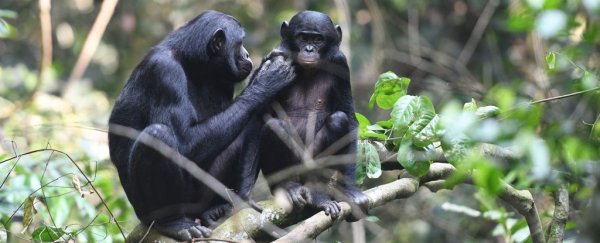If you think your mom is laying it on thick about producing grandchildren, take heart: At least you're not a male bonobo.
Bonobo mothers have been seen performing a variety of behaviors that seem to lend their sons an advantage when it comes to fathering babies, according to a study published Monday in Current Biology Magazine.
What kind of behaviors? Well.
When a male bonobo is mating with a female, his mother will sometimes run interference against any other males that come too close and try to interrupt the lovemaking.
Wingman? How about wingmom?
Bonobo mothers have also been observed actively breaking up copulations between females and other males who aren't their sons, calling to mind the title of a certain crudely named, big-screen comedy released last year.
Sometimes a bonobo mom will even team up with her son to beat up sexual rivals and help him rise in their social group's hierarchy.
Scientists have long known that mother bonobos do all of these things, but until now, they've never been able to provide evidence that the meddling actually gave their sons an advantage that led to more grand bonobos.
The new research, however, documented that wild male bonobos in Congo father three times as many offspring when their moms are still in the picture than bonobos whose mothers have died or left their group.
By comparison, the same researchers found no such significant advantages for wild male chimpanzees in Côte d'Ivoire, Tanzania and Uganda. This is important because bonobos and chimpanzees are very closely related.
But chimpanzee mothers don't typically display any of these matchmaking - or rather, match-defending - behaviors for their sons. This suggests that the boost in baby bonobos is at least partly due to the mothers' son-assisting behavior and not simply good genetics.
But there's also a social component. In chimpanzee groups, males always retain dominance. In bonobo groups, males and females share dominance, and females are usually protected from violence from males.
"I am pretty sure we see these effects in bonobos because females have these high social ranks," said Martin Surbeck, a biologist at the Max Planck Institute for Evolutionary Anthropology and lead author of the study.
"Where we are less sure is the actual mechanism by which the presence of mums helps their sons."
And the mothers' presence alone is important.
In a 2010 study, Surbeck and his co-authors observed that bonobo males tend to remain on the outskirts of the group when they don't have their mothers nearby. That's bad news for those males' reproduction rates, because the center of the group is where the most reproductively available females congregate.
On the contrary, even low- and mid-ranking males were able to safely enter the center of the group when their moms accompanied them.
"They act as social passport allowing males to 'enter' the female core of the bonobo society," Surbeck wrote in an email.
Mothers also seem to influence the rank of their sons, with more powerful mothers having more powerful sons. "And once mothers lose their high ranks, this can affect their sons' ranks as well," Surbeck said.
Ammie Kalan, a primatologist at the Max Planck Institute for Evolutionary Anthropology who was not involved in the new study, called it "fascinating" in the way it invokes comparisons to the so-called grandmother hypothesis for human evolution.
The grandmother hypothesis attempts to explain why female humans are among the very few animals that experience menopause. After all, if evolution is all about passing on your genes, what benefit would there be in hanging up your reproductive ability?
The answer, according to the hypothesis, is that after a certain age, grandmothers actually have a better chance of passing on their genes by helping their offspring rather than by creating more offspring themselves.
"That being said, I would find it very interesting to know what has greater predictive value for reproductive success of a bonobo male," said Kalan, who collaborates with some of the study's authors. "Is it his mother being present? His mother's rank in the group? Or his own rank?"
Cat Hobaiter, a University of St. Andrews primatologist, also said she found the research interesting. "But I wonder how much of this really is a species-level difference, and how much is about the opportunity for particular pairs of mothers and sons," she wrote in an email.
Another study from 2011 showed that bonobo mothers are less inclined to help their sons when they are pregnant themselves, for instance. And while bonobos are relegated to one relatively small portion of central Africa, chimpanzees are found in pockets across the continent, and there's great variation between each group.
East African chimpanzee groups come together and split up frequently, so a mother that still lives with her son may not see him for days or weeks at a time. On the other hand, West African chimpanzees seem to form more cohesive social groups, lending mothers more opportunities to help their offspring.
In any case, the new bonobo study shows intriguing evidence for the grandmother hypothesis in one of our closest relatives, Surbeck said.
"The interesting twist is that in humans, it was originally thought to happen through support of their daughters," said Surbeck, "while in bonobos it is through the sons."
2019 © The Washington Post
This article was originally published by The Washington Post.
